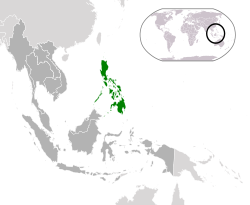邊那巴多共和國
邊那巴多共和國 Republic of Biak-na-Bato Repúbliká ng̃ Biak-na-Bató República de Biac-na-Bató | |||||||||||||
|---|---|---|---|---|---|---|---|---|---|---|---|---|---|
| 1897年—1897年 | |||||||||||||
 邊那巴多共和國在亞洲地圖上的位置 | |||||||||||||
| 地位 | 未受承認國家 | ||||||||||||
| 首都 | 聖米格爾 | ||||||||||||
| 常用語言 | 西班牙語、他加祿語 | ||||||||||||
| 政府 | 共和國 | ||||||||||||
| 總統 | |||||||||||||
| 歷史時期 | 菲律賓革命 | ||||||||||||
• 建立 | 1897年11月1日 | ||||||||||||
• 終結 | 1897年12月15日 | ||||||||||||
| 面積 | |||||||||||||
| 1897年 | 300,000平方公里 | ||||||||||||
| |||||||||||||
邊那巴多共和國(英語:Republic of Biak-na-Bato,他加祿語:Repúbliká ng̃ Biak-na-Bató, 西班牙語:República de Biac-na-Bató),又譯為破石洞共和國或比阿克納馬多共和國,被部分菲律賓人認為是國內第一個憲制共和國,為菲律賓第一共和國的前身。其締造人是菲律賓革命領袖埃米利奧·阿奎納多及其領導的卡蒂普南革命組織。安達斯·波尼斯奧領導卡蒂普南進行巴林塔瓦克起義後,阿奎納多應聲參加革命,後阿奎納多與波尼斯奧發生分歧,阿奎納多在特赫洛斯大會上領導通過了解散卡蒂普南、建立邊那巴多共和國的決議。
雖然邊那巴多共和國成立了菲律賓第一部共和制憲法,但它的壽命只維持了一個月,隨著西班牙殖民軍加大反撲攻勢,阿奎納多與殖民當局簽訂投降協議,自己則流亡香港,邊那巴多共和國宣告解體。
歷史
[編輯]卡蒂普南及巴林塔瓦克起義
[編輯]1892年7月,菲律賓反殖民革命派安達斯·波尼斯奧成立秘密組織卡蒂普南,1896年8月26日卡蒂普南因計劃敗露而提前起義,因起義地在奎松巴林塔瓦克山,史稱巴林塔瓦克起義。在卡蒂普南的號召下,菲律賓全境紛紛揭竿而起,埃米利奧·阿奎納多就在此時在甲米地發動起義,占領了甲米地全境因而名聲大噪。
革命過程中,保守派阿奎納多和主戰派波尼斯奧的矛盾愈加激烈。1896年10月,阿奎納多發布文告,將建立革命政府,卻隻字不提卡蒂普南。12月,革命大本營遷往甲米地,阿奎納多拒不接受卡蒂普南的命令。1897年2月,在西班牙殖民軍的圍剿下,卡蒂普南退至呂宋北。[1]
特赫洛斯大會及臨時政府
[編輯]1897年3月22日,在阿奎納多任主席的特赫洛斯大會(Tejeros Convention)上,阿奎納多及其支持者「馬格達洛委員會」決議解散卡蒂普南、成立共和國臨時革命政府。阿奎納多當選為總統,馬里亞諾·特里亞斯當選為副總統。然而波尼斯奧拒不承認大會的決定,也不承認革命政府,宣稱要帶領卡蒂普南繼續革命。[2]5月10日,波尼斯奧及其部下被阿奎納多派人逮捕並以「叛國」之罪名處決,波尼斯奧的妻子亦未能逃過遭到強暴的厄運。[3]
邊那巴多共和國
[編輯]1897年5月,西班牙加大反撲攻勢,阿奎納多臨時政府被迫放棄甲米地。7月,西班牙政府要求革命軍放下武器,阿奎納多發表《致菲律賓英勇子民》(To the Brave Sons of the Philippines),提出了停火條件:
- 驅逐方濟各會傳教士,並歸還其占有的土地;
- 允許菲律賓在西班牙議會占有席位;
- 實現出版自由和,對宗教信仰實行寬容政策;
- 給予半島籍和孤島籍出身的政府公務員以相同的薪水待遇;
- 廢止政府驅逐公民的權力;
- 全民平權。[4]
8月,阿奎納多臨時政府突破重圍遷往布拉幹省邊那巴多山區,至此雙方戰事零星,進入相持狀態。11月1日,阿奎納多在邊那巴多召開代表會議,通過邊那巴多共和國憲法,由阿奎納多任總統,其臨時政府的總統一職依法終止。[5]。根據憲法,1897年11月2日成立「全國最高委員會」,作為國家議會。憲法序言部分作出如下聲明:
The separation of the Philippines from the Spanish monarchy and their formation into an independent state with its own government called the Philippine Republic has been the end sought by the Revolution in the existing war, begun on the 24th of August, 1896; and therefore, in its name and by the power delegated by the Filipino people, interpreting faithfully their desires and ambitions, we, the representatives of the Revolution, in a meeting at Biac-na-bato, Nov. 1st. 1897, unanimously adopt the following articles for the Constitution of the State.[6]
投降西班牙殖民政府
[編輯]1897年底,菲律賓總督普里莫·德里維拉(Primo de Rivera)認識到鎮壓革命軍已無可能,於是決定派遣馬尼拉著名律師佩德羅 A. 帕特諾(Pedro A. Paterno)與阿奎納多政府進行談判。帕特諾早在革命期間就斡旋於雙方政權,穿梭外交的努力終於換來阿奎納多的妥協,促成阿奎納多與殖民政府於1897年12月14日簽訂《邊那巴多條約》(Pact of Biak-na-Bato,或譯《破石洞條約》)。邊那巴多共和國成立僅一個月便宣告解體。[7]。
根據條約內容,西班牙政府不逮捕革命者也不追究其責任,給予阿奎納多集團十萬比索,在菲律賓實行行政和立法改革,3年內實行菲律賓自治;而革命組織需要解散軍隊,停止武裝鬥爭,阿奎納多被驅逐出境(後流亡香港)。條約聲明全文如下[8]:
(1) That I would, and any of my associates who desired to go with me, be free to live in any foreign country. Having fixed upon Hongkong as my place of residence, it was agreed that payment of the indemnity of $800,000 (Mexican) should be made in three installments, namely, $400,000 when all the arms in Biak-na-Bató were delivered to the Spanish authorities; $200,000 when the arms surrendered amounted to eight hundred stand; the final payment to be made when one thousand stand of arms shall have been handed over to the authorities and the Te Deum sung in the Cathedral in Manila as thanksgiving for the restoration of peace. The latter part of February was fixed as the limit of time wherein the surrender of arms should be completed.
(4) It was also agreed that the religious corporations in the Philippines be expelled and an autonomous system of government, political and administrative, be established, though by special request of General Primo de Rivera these conditions were not insisted on in the drawing up of the Treaty, the General contending that such concessions would subject the Government to severe criticism and even ridicule.[8]
(2) The whole of the money was to be paid to me personally, leaving the disposal of the money to my discretion and knowledge of the understanding with my associates and other insurgents.
(3) Prior to evacuating Biak-na-Bató the remainder of the insurgent forces under Captain-General Primo de Rivera should send to Biak-na-Bató two General of the Spanish Army to be held as hostages by my associates who remained there until I and a few of my compatriots arrived in Hongkong and the first installment of the money payment (namely, four hundred thousand dollars) was paid to me.
政府概況
[編輯]憲法及制度
[編輯]邊那巴多共和國憲法由菲利克斯·費勒(Felix Ferrer)與伊薩貝羅·阿塔瓊(Isabelo Artacho)根據古巴憲法幾乎是原文照搬而來。這部憲法實行民主共和制、「最高委員會制」(議會制),於1897年12月2日正式實施。
主要領袖
[編輯]「最高委員會」人員如下[9]:
| 職位 | 姓名 |
|---|---|
| 總統 | 埃米利奧·阿奎納多(Emilio Aguinaldo) |
| 副總統 | 馬里亞諾·特里亞斯(Mariano Trías) |
| 外交部長 | 安東尼奧·蒙特內格羅(Antonio Montenegro) |
| 戰爭部長 | 埃米利亞諾·列戈·德迪奧斯(Emiliano Riego de Dios) |
| 內政部長 | 伊薩貝羅·阿塔瓊(Isabelo Artacho) |
| 財政部長 | 巴爾多梅羅·阿奎納多(Baldomero Aguinaldo) |
參考及外鏈
[編輯]- ^ Don Emilio Aguinaldo y Famy, Chapter II. The Treaty of Biak-na-bató, True Version of the Philippine Revolution, Authorama: Public Domain Books. 23 September 1899 [23 September 2008]
- ^ The Project Gutenberg eBook of Dimasalang Kalendariong Tagalog (1922), by Honorio López
- ^ Ocampo 1999
- ^ Agoncillo 1990,第182–183頁
- ^ Agoncillo 1990,第183頁
- ^ Constitution of Biak-na-Bato, Wikisource.
- ^ Zaide 1994,第252頁
- ^ 8.0 8.1 Aguinaldo 1899 Chapter II. The Treaty of Biak-na-bató
- ^ Agoncillo 1990,第183–184頁


